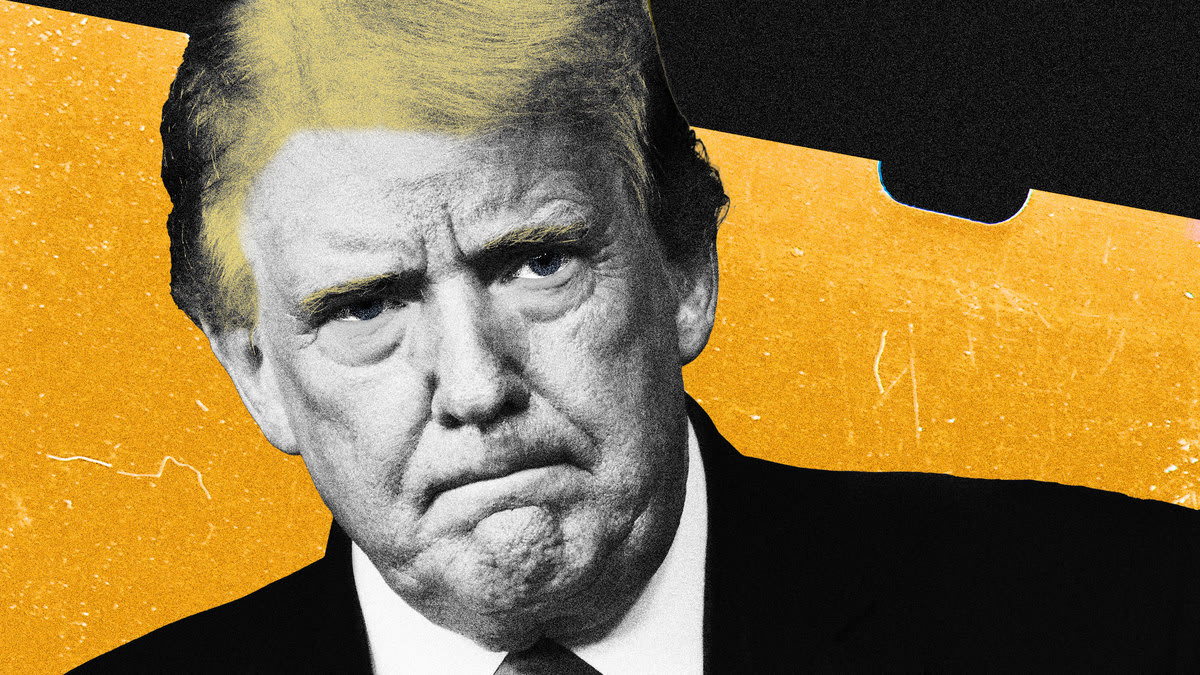In a matter of hours Tuesday, former President Donald Trump suffered humiliating defeats in courtrooms across the country that put him on track to have his personal taxes exposed, see his company dismantled, face a trial for an alleged rape, and confront the unencumbered power of the Department of Justice.
It was setback after setback for the former president, who would have struggled to keep up with all the bad news hour by hour—just as journalists struggled to keep track of all the updates and court appearances on Tuesday.
Covering the cascade of legal clashes forced this reporter to shuttle between two courthouses on New York’s Centre Street and step out of live testimony for courtroom teleconferences in two different states, while the Supreme Court also ruled that Congress had a right to Trump’s tax returns.
In the midst of this maelstrom of legal trouble, the real estate mogul’s longtime personal accountant completely disavowed the company’s financial shenanigans, saying if he’d known the way executives were dodging taxes for years, he would have died of shock. “I probably would've had a heart attack,” Donald Bender testified in Manhattan criminal court, where the Trump Organization is defending itself at trial against the District Attorney’s Office.
Trump’s terrible, horrible, no good, very bad day started at 10 a.m. in Manhattan civil court, where his family company is fighting the New York Attorney General’s $250 million lawsuit that accuses the company of widespread bank fraud. Justice Arthur F. Engoron, who had to repeatedly step in during the AG’s three-year investigation to force the Trumps to testify and turn over documents, has finally lost his patience.
The judge, clearly exasperated and wincing from the bench as he spoke, scolded the company for its delay tactics.
“You can’t keep making the same arguments after you’ve already lost,” Engoron told the company’s lawyers.
He set the civil trial for Oct. 2, 2023, which means that Trump’s namesake company might be stripped of its ability to do business in New York in the midst of his next presidential run.
Then at 2 p.m., a panel of federal appellate judges in Atlanta indicated they are inclined to completely unravel Trump’s attempt to block the FBI, which is investigating the way he kept more than 100 classified records without permission at his oceanside Florida estate. At issue is whether it was appropriate for a MAGA-friendly federal judge—whom Trump himself appointed while he was president—to insert herself into the FBI’s investigation and take the unprecedented step of blocking special agents from reviewing the government records they’d seized.
Although questions still circulate over how Trump gamed the system to land District Judge Aileen Cannon, appellate judges on Tuesday squarely focused on the damaging precedent they could set by allowing her to keep the case—and continue making peculiar, one-sided rulings that limit a law enforcement investigation before there’s even an indictment.
“We would have to be concerned about the precedent we create that would allow any target of a federal investigation to go into a district court and have it entertain this... and interfere with the executive branch’s ongoing investigation,” one of the judges said on the call.
These appellate judges also seemed to lose their patience with the outlandish tactics now being employed regularly by Trump’s cadre of lawyers, who insert Fox News and Newsmax political rants into legal briefs and court appearances.
Halfway through the half-hour hearing, Appellate Judge "Britt" Cagle Grant interrupted Trump defense lawyer James Trusty to stop him from referring to the FBI’s Aug. 8 search as a “raid.”
“There’s not a situation in this country where a sitting president authorized the raid of a former president’s home—” he began, before being asked if the term “raid is proper.” He quickly apologized for using what he called a "loaded term,” only to use it again minutes later.
That appellate hearing ended abruptly, without judges breathing any life into Trump’s side.
“We really can’t predict how judges are going to rule based on who appointed them,” Loyola Law School professor Jessica Levinson noted. “Trump appointees in general are more concerned with a conservative agenda than they are with handing Trump a win… they’re very much aware this is about setting precedent in other criminal investigations.”
Minutes later that afternoon, the Supreme Court denied Trump’s attempt to block Democrats on the House’s Ways and Means Committee from getting copies of his personal tax returns from 2013 to 2018. Supreme Court justices made the decision without even authoring an opinion.
Trump managed to be the only American president in recent history to refuse to make his taxes available for public scrutiny, raising widespread concerns about graft and corruption. This Supreme Court order opens the door for Rep. Richard Neal (D-MA), who leads the Ways and Means Committee, to get them from the Internal Revenue Service under the guise of determining “the extent to which the IRS audits and enforces the federal tax laws against a president.”
The question now is whether Democrats in Congress will be able to actually get them before Republicans take control of the House in January—and what they’ll do with them.
“Look, you play with fire long enough, you’re gonna get burned, and he’s made a career out of dodging liability with a bevy of lawyers and accountants, but someday you gotta pay the piper, and I think all of those things are catching up to him,” said Jared Carter, a Vermont law school professor.
Immediately following the Supreme Court’s decision, Trump lawyers were on a phone call at 3 p.m. with a Manhattan federal judge trying to brace for a new lawsuit claiming that the real estate mogul raped a journalist at a city department store in the mid-1990s. These allegations first surfaced when advice columnist E. Jean Carroll wrote a memoir, which led to Trump trash-talking her from the White House. Trump’s comments led to a defamation lawsuit—and a recent Trump deposition under oath that still isn’t public.
But now that New York’s new adult survivor’s law will soon allow victims to sue their abusers, Trump will face the same kind of legal action that ruined Bill Cosby. This lawsuit isn’t expected to raise any new issues, but it will target Trump directly—and his wallet.
Given that Trump already testified behind closed doors, Carroll’s lawyer, Roberta Kaplan, thinks it could go to trial as early as February—kneecapping Trump’s nascent 2024 presidential campaign.
Alina Habba, the same Trump defense lawyer who sparred with a state judge earlier in the day, surprised the court by revealing that she’s not even sure if she’ll continue to represent Trump on the Carroll case.
“I have not even been retained on that matter,” she said. “I do not know if I’m going to be retained on that matter.”
At that, U.S. District Judge Lewis A. Kaplan revealed he—like so many other judges that day—had run out of patience, too.
“Your client has known this is coming for months, and he would be well advised to decide who’s representing him in it,” he admonished in a sharp tone.
Just when it seemed as if things couldn’t get any worse for Trump on Tuesday, the former president’s longtime trusted personal accountant plunged a knife into his back at 3:55 p.m.
Donald Bender, who stuck with Trump and the Trump Organization even as he worked at several different iterations of accounting firms, ended up testifying against the former president’s eponymous family company in Manhattan criminal court. That’s where the New York County District Attorney’s Office has the Trump Organization on trial for dodging taxes by allowing its full-time executives to avoid taxes in two different ways: paying themselves as “independent contractors” and getting untaxed corporate perks to minimize their on-the-books salaries.
Earlier in the trial, prosecutors established how the company’s chief financial officer, Allen Weisselberg, reduced his taxable salary by diverting it to a high-end corporate apartment, luxury cars for him and wife (who wasn’t even a real employee), and tuition for his grandkids at an expensive private school. Prosecutors laid out how Weisselberg’s son, Barry, also received these kinds of perks. And they showed how the company controller, Jeffrey S. McConney, was in on it.
Bender prepared taxes for the Weisselbergs and the Trumps—including company executives Don Jr., Ivanka, Eric. He was technically a witness for the Trump Organization, claiming incredulously that he had reviewed all the books but somehow had no idea executives were doing this for years. But prosecutors tore that down as the sunset’s orange glow began to fill the courtroom.
Susan Hoffinger, Manhattan DA's chief of investigations, asked what he would have done had he known about the executive compensation scheme sooner. Unlike the Trump Organization employees who testified before him, this accountant wasn’t going down with the ship.
“I would’ve called Jeff McConney and said, ‘What’s going on?’” he testified.
“I would have probably been very concerned,” he said.
“We would have had serious conversations about continuing with the client,” he added.
The global accounting company where Bender maintains his practice, Mazars USA, did just that earlier this year, when it decided to ditch the Trump Organization—and disavow any of its financial statements.
Decisive steps will be taken in each of these cases in the coming weeks. The Manhattan jury will come back from its Thanksgiving holiday break and soon start deliberating over whether the Trump Organization broke the law and dodged taxes. The New York AG will start sharing evidence with the Trump Organization, potentially revealing to the Trumps whose testimony exposed the company’s financial mischief. And Carroll’s lawyers will push to initiate a trial.
On top of it all, these cases are playing out as Trump faces a new and very real threat of criminal indictment from the DOJ’s special counsel, Jack Smith, who was appointed last Friday by Attorney General Merrick Garland to look into Trump’s mishandling of classified materials, his attempts to obstruct that investigation, and the former president’s attempts to remain in power after he lost the 2020 election.
The words Trump lawyer Alina Habba uttered at the start of the day could be repeated by Trump’s legal team in every courtroom from here on out.
“My client shouldn’t be in this position. We shouldn’t be in this court—and yet we are.”

